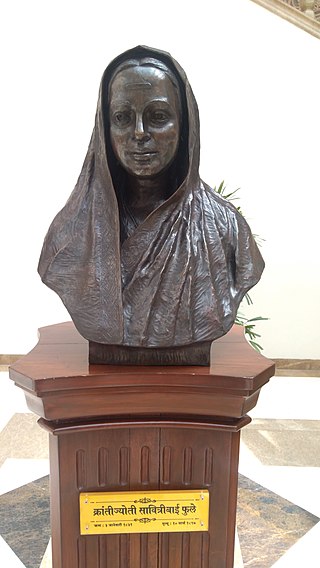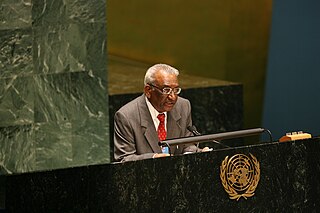
Jyotirao Govindrao Phule was an Indian social activist, businessman, anti-caste social reformer and writer from Maharashtra. His work extended to many fields, including eradication of untouchability and the caste system and for his efforts in educating women and oppressed caste people. He and his wife, Savitribai Phule, were pioneers of women's education in India. Phule started his first school for girls in 1848 in Pune at Tatyasaheb Bhide's residence or Bhidewada. He, along with his followers, formed the Satyashodhak Samaj to attain equal rights for people from lower castes. People from all religions and castes could become a part of this association which worked for the upliftment of the oppressed classes. Phule is regarded as an important figure in the social reform movement in Maharashtra.The honorific Mahātmā, was first applied to him in 1888 at a special program honoring him in Mumbai.

Savitribai Phule Pune University (SPPU), formerly the University of Pune, is a public state university located in the city of Pune, India. It was established in 1949, and is spread over a 411 acres (1.66 km2) campus in the neighbourhood of Ganeshkhind. The university houses 46 academic departments. It has about 307 recognised research institutes and 612 affiliated colleges offering graduate and under-graduate courses. Savitribai Phule Pune University Ranked 12th NIRF Ranking in 2022

Pune district is a district in Western Maharashtra with Administrative Headquarters in Pune city. Pune district is the most populous district in the Indian state of Maharashtra. It is one of the most industrialised districts in India.

Savitribai Phule was one of the first female teachers in India, a social reformer, and a poet. Along with her husband, Jyotiba Phule, in Maharashtra, she played a vital role in improving women's rights in India. She is considered to be the pioneer of India's feminist movement. She strived to abolish discrimination and unfair treatment of people based on caste and gender. She and her husband were pioneers of women's education in India. They started their first school for girls in 1848 in Pune at Tatyasaheb Bhide's residence or Bhidewada.

Shri Swami Samarth Maharaj also known as Swami of Akkalkot was an Indian Hindu god of the Dattatreya Tradition. He lived during the nineteenth century from 1858 to 1878 and is a known spiritual figure in various Indian states including Karnataka and Maharashtra. Swami Samarth traveled all across the Indian subcontinent and eventually set his abode at Akkalkot, a village in present-day Maharashtra. He is thought to have arrived at Akkalkot on a Wednesday, during either September or October in 1856. He resided at Akkalkot for close to 22 years.
Vairag is a town in Barshi Taluka of Solapur district in Maharashtra, India. The village is located centrally between Solapur and Barshi.
Takali Dhokeshwar is a village in Ahmednagar District, Maharashtra, India. It is located at the intersection of the Mumbai - Vishakhapattanam highway and the Satara - Nashik road.

Dr. Janardan Madhavrao Waghmare is an Indian politician and educationist. He has served as a Member of Parliament in the Rajya Sabha from Maharashtra. He was also the President of the Latur Municipal Council.
Nigdi is an affluent suburb in the city of Pune, India. Bhakti Shakti, Nigdi is considered as the gateway to Pune. Nigdi Pradhikaran is also an important administration locality for industrial area Pimpri-Chinchwad. Nigdi is a well developed locality with property rates being high in and around Bhakti Shakti and in Pradhikaran localities. Nigdi is also home to Pimpri Chinchwad New Town Development Authority, GST bhavan, Kendriya Sadan - Pune CBI headquarters and many more. Nigdi is near Akurdi, Dehu road and Chinchwad railway station. There is a bus terminal at Bhakti Shakti, Nigdi where you get buses to every corner of the city. Luxury travels and State Transport buses are also easily available in Nigdi.

Brihan Maharashtra College of Commerce is a college in Pune, Maharashtra, India. The college was established in 1943 by the Deccan Education Society. It is affiliated to Savitribai Phule Pune University.
Modern education was introduced to Maharashtra region during the 19th century by British colonial administration. Census of 2011 showed literacy rates in the state for males and females were around 78% and 67% respectively. Education at different levels in the state is provided by the state, government supported charities, or private institutions. There are also a number of institutes offering vocational training.

Jnana Prabodhini Prashala, is a high school located in Sadashiv Peth, Pune, India. It was started by educationist Dr. V. V. Pendse, in 1962.
Mahatma Phule is a 1954 Marathi film directed by Pralhad Keshav Atre. The film is based on the life of social reformer and activist Jyotirao Govindrao Phule.
Avinash Dharmadhikari is a former Indian Administrative Services officer. He was a well known social activist and free-lance journalist before joining IAS. After serving on various posts during his administrative career of ten years he resigned from IAS in 1996 for the reason that can be best described in Arun Shourie's words "to be able to serve Indian society better". He was Deputy Secretary to the Chief Minister of Maharashtra at the time of his resignation. He is founder and director of Chanakya Mandal Pariwar, working in the field of Career Guidance and Personality Development. He unsuccessfully contested for Lok Sabha as an independent candidate against Suresh Kalmadi. He was Director General of Nehru Yuva Kendra Sangathan in 2001 under Ministry of Sports and Youth Affairs, Government of India. As a social activist he has been part of many movements such as farmers' movements and movements against corruption. He was also a part of Team Anna during India against corruption movement. He has authored many books which includes 75 Soneri Pane, Aswastha Dashakachi Diary, Nava Vijaypath, Ek Vijaypath, Swatantra Nagarik, Jinkanara Samaj Ghadawanari Shikshanpadhhati, Aani Aapan Saglech, Ratra Gahirichya Tisarya Prahari(a collection of poems) . Aswastha Dashakachi Diary has been translated into English by Gauri Deshpande titled: Diary of a Decade of Agony.

General Manoj Mukund Naravane, is a retired Indian Army General who served as the 28th Chief of the Army Staff (COAS), as well as the temporary Chairman of the Chiefs of Staff Committee from 15 December 2021 until his superannuation on 30 April 2022. He took over as COAS from General Bipin Rawat on 31 December 2019. Prior to his appointment as the COAS, the general officer served as the 40th Vice Chief of Army Staff of the Indian Army, General Officer Commanding-in-Chief (GOC-in-C) of Eastern Command and General Officer Commanding-in-Chief of Army Training Command. He also served as General Officer Commanding II Corps and also as General Officer Commanding Delhi Area.

Ram Vitthal Satpute is National Vice President of BJYM and a Member of Maharashtra Legislative Assembly elected from Malshiras.
Girish Y. Prabhune is an Indian social worker and social activist known particularly for his work towards upliftment of the nomadic Pardhi community and their children since 1970. He was conferred the Padma Shri in 2021 in Social Work category.

Chandrashekhar Agashe College of Physical Education (CACPE) is an Indian autonomous research college based in Gultekdi, Pune, Maharashtra, India. The university specializes in sports and physical education. It was founded on 1 July 1977, by Shivrampant Damle, who began work for its founding in 1938. It was named after Chandrashekhar Agashe. The university is affiliated to the Savitribai Phule Pune University.













